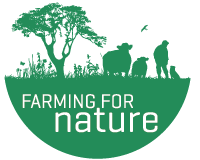Michael Hickey
One of our first cohort of pioneering Ambassadors, Michael Hickey sadly passed away in 2024. Michael ran a 100-acre organic farm in New Inn, Co. Tipperary where he managed half the farm for tillage and the rest for his herd of 40 Aberdeen Angus and horses. The farm had a variety of habitats including seasonally flooded grasslands, fen areas, pastures and meadows. Michael managed his field boundaries as habitats and is a good example of someone who has spent the time looking to see what management practices best suits each habitat to give the most for biodiversity. “I have given 30% of my farm over to habitats” Michael was trying a number of different multi-seed mixes, both solo and over-seeding. He enjoyed being a mentor on The Horse's Mouth mentorship programme.
In 2024, the Michael Hickey Hedgerow Award was awarded to Pat Maher for recognition of his amazing hedgerow management and to honour Michael's memory.
Ar dheis Dé go raibh a anam.
NOMINATION:
Irish organic farming pioneer Michael Hickey farms for nature near New Inn, Co. Tipperary, with his wife Ute and sons Luke and Liam. Michael, who lived and worked all over Australia for 10 years, returned home in 1981 to take up his family farm. His experience of organic agriculture in Australia, Asia and India convinced him that a gentler approach to farming was required, and he immediately set about applying organic principles and practices to his run-down and long-neglected farm. An early member of IOFGA, he was a signatory to their Articles of Association in 1986. I first met Michael in the ‘80s while on the board of IOFGA, and was impressed by his outspoken, articulate and passionate advocacy for organic farming in Ireland.
Gortrua Farm consists of 40 ha (100 acres) beside the Suir, with its ‘Special Area of Conservation’ adjoining the river, grassland subject to seasonal flooding (the ‘Inches’), a large fen-like area and well-drained, productive permanent pasture and meadow. Michael designated his field perimeters as habitats, and by the time the REPS scheme was introduced, they provided examples for official hedgerow policy. Today his hedgerows are mature linear woodlands providing shelter and biodiversity throughout the farm.
His stocking rate of cattle and horses is deliberately lower than most farmers. Michael breeds all his own Aberdeen Angus replacements, and for most of his career they have been butchered locally and sold directly to consumer groups. His horses have been trained and mostly exported to England. Fodder conservation is mostly hay, with silage saved only when conditions are unsuitable. Initially Michael grew grain but found it was in conflict with the type of land he was farming. He has long since reached an accommodation with nature, and believes his farming practices are in synergy with the ecosystem.
Michael regularly hosts botanical groups and farm walks for agricultural students. He has trained WOOFERS (farm volunteers on organic farms) and given public talks on sustainable farming. A number of scientific surveys have been carried out on the farm. One was carried out by Michael himself, when he undertook a Diploma in Ecology with UCC(1). In this comparison with adjoining farms with similar soil profiles, his land supported 126 species of flora compared to nine. A 2003 publication “The effects of the intensification of agriculture on northern temperate dung beetle communities” indicated significantly higher dung beetle populations and species diversity on organic farms, with Gortrua having the greatest number of species found(2).
After nearly 40 years of farming and “living in agreement with nature”(3), the farm is now a nature reserve in its own right.
References:
1. Hickey, Michael. 2002. A Comparison of the Flora of three adjoining fields in South Co. Tipperary. Thesis, Diploma of Ecology, UCC.
2. Hutton, Stephen A., & Giller, Paul S. 2003. The effects of the intensification of agriculture on northern temperate dung beetle communities. Journal of Applied Ecology 40, 994 – 1007.
3. Curren, Cait. 2001. Common Ground Issue 60, 15-16.
Nominator: Dermot Grogan, AAI, Department of Agriculture, Food & Marine






